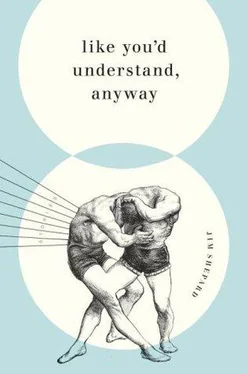In the sun we will seem an endlessly wide threshing machine of blades and unyielding surfaces. Our paean will be Zeus Savior, spare us who march into your fire. They'll hear a roar, a windhowl, our singing together. We will find that bright vibration, that pitch at which the spirit oscillates. We will march through their archers' bolts like covered wagons in a hailstorm. They will see, as we close, the spears of our first four ranks swing down to the horizontal. They will discover how far beyond our shields the blades of those shafts can extend. We will break into a run. We will hit them like a bull. We will savage them of all they have. Our collision with the wood and wicker of their shields will be like the sound of kindling underfoot. After the shock of impact, our ranks behind will seat their shields into our backs, hoist their shoulder bones under the upper rims, and, splaying dust as they scrabble for footing, push and shove with all their force. The invader's wicker will have no purchase against the implacable smoothness of our bowl-shaped bronze. Their front ranks will be left trampled in the gleaning-ground that will spool out behind us as the butchery rolls forward, where they'll meet the spiked clubs and gutting knives and bone-breakers of our light infantry. Our churning feet will continue the push even slipping on their blood, like boys' soles on river rocks. We will hit them like a wave, the wild water seething into seaside homes; we will leave them like a tidal pool after a storm, with its clamor of blasted lives.
All of this is sent to me, or generated in me: visceral shadows instead of words, turning and turning in my imagination. In the cattle-stunning light before we step off, I can see it, my head that open gate. They will be cut down, body on body. They will endure being god-overturned in war. Their slaughter will extend all the way back to their ships at anchor, where we, the right wing, the tribe of Aiantis, will be like the gods jumping both feet into their ranks, about to learn the whole reach of pain, our sandals piercing the shallows and the breakers' roil, our thighs surging back and forth in the water's wilderness of spumy sand, our bodies wading in full armor into the surf, our weapons slashing at the back-watering oars and cable ropes sliding in the waves' retreat, and gaffing the wounded like fish, and there my brother will lay hands on the backsliding deck of a trireme, and there, while I watch, a Persian's boarding axe will chop through one of his wrists, and there on the beach his life will stream out of him and cover us in the river mouth of his blood, with his last words to me that their ships are getting away; their ships are getting away.
They will find out: all that begins well can come to the worst end. Having done evil, no less will they suffer. And more in the future. In their pride and self-deception they will have led themselves to the disasters of this day and more coming on. As I am for my family, with my friends and neighbors I'll be their sorrow, a sad hollow son born to bring home misfortune, to initiate the roll of grief.
We can feel our hearts in their bony cages. We're about to enroll them in the academy of chaos and self-command. We're about to lead them to that world in which their sons and brothers are dead and gone. Lost and always there. And they're about to form for us that jury in which each man reads his own future: home and hearth, or no home and hearth. Pain, or release from pain.
14 June 1963 Morning
Though we've been in this cottage for only a day, I got up at first light and set about a housecleaning. Solovyova is still depressed and lay on her bed like a corpse while I worked. When I finished I left. In the chilly air the sun warmed my arms and long blue shadows crossed the roadside weeds and gravel. I walked through the pines to our little river and sat with my toes in the mud. Bream and sturgeon explored the stones on the bottom, flicking their fins.
We are in Kazakhstan, 370 kilometers northeast of a town called Baikonur. Solovyova and I are in one cottage and Korolyov himself is in the other. The cottages were requisitioned for Yuri Gagarin's flight and have been used ever since. Their original owners came by with flowers when we arrived, in honor of our undertaking. The cottage fronts are covered with creepers and face the pine forest. Behind and above them looms the launchpad in all its concrete immensity. It's a kilometer away but looks as if it could be touched with an outstretched hand. The sides of the blast pit resemble the face of a dam. The command bunker alongside is a squat hedgehog with jagged steel spars spiking from its super-hardened roof at all angles, so a malfunctioning first stage falling atop it would break up, thereby diffusing the focus of the blast.
Diary! You are a historic document: my name is Valentina Vladimirovna Tereshkova, and I was born in the Yaroslavl Raion, and I am twenty-four years old, and by 12:30 Moscow time the day after tomorrow I will have put on my orange spacesuit and climbed into my own spacecraft, the Vostok 6 , to rendezvous with a fellow cosmonaut, Senior Lieutenant Valery Fyodorovich Bykov-sky, 150 miles above the Earth. I will become, then, the tenth person, the sixth Russian, and the first woman in space.
But I have more reason to be unable to sit still, as if electrified by joy: the mind that has laid me open to awe and gratitude — the man for whom I'd give whatever I have to give — is already fulfilling his dream, orbiting above us in Vostok 5. And I am going to join him.
Technically, of course, that's incorrect. Our mission will be the first step in developing our country's capabilities for orbital rendezvous. Twice daily, during the parabolas of our orbits, we'll approach to within less than two kilometers of each other. But two kilometers is very close. At that range his capsule will be the size of a dried pea at arm's length. Two kilometers, given the slight imprecision of the trajectories, is as near as they dare bring us. As Korolyov put it, the achievement of two cosmonauts orbiting simultaneously would be compromised if they were to kill each other.
Even so, we'll be in space together. In other words, as Solov-yova pointed out before she fell asleep last night, the combined efforts of the most diligent minds in the Soviet Union — some one hundred thirty bureaus and thirty factories, employing over seven thousand scientists, designers, and engineers — have come together for however many years of labor in order to indulge my sordid and criminally irresponsible obsession with a Hero of the Soviet Union who bears a spotless reputation. “So that's the best they could do for you: two kilometers?” she asked, reaching to turn off the light.
Bykovsky is married, though he told me he hasn't touched his wife in years.
The plan was to make dual use of the second stage of this group mission to put the first woman in space. And after everything— the written examinations and the centrifuge, the parachute jumps and the pressure chamber, the psychological prodding and poking and the endless humiliations of the medical testing — Solovyova was judged top of the list. But Korolyov was concerned about her unsteady morals. It was felt she gave improper replies in the final interviews. When asked what she wanted from life, she said she wanted everything that it could offer. She maintained that a woman could smoke and still remain decent. She was unapolo-getic for having traveled unescorted into town.
When asked what I wanted, I said I wished to support the Komsomol and the Communist Party. I took no trips to town. I do not smoke.
In the end, there were advantages to favoring a farm girl over a teacher's daughter. I was a girl from the backwoods— the way Gagarin and Premier Khrushchev were boys from the backwoods — and our country was telling the world that even we could achieve at the highest level. “The meek shall inherit the earth,” Solovyova said when the other women sought to console her after the news had been released.
Читать дальше












